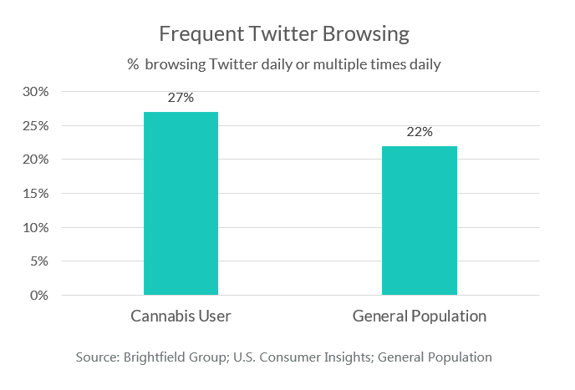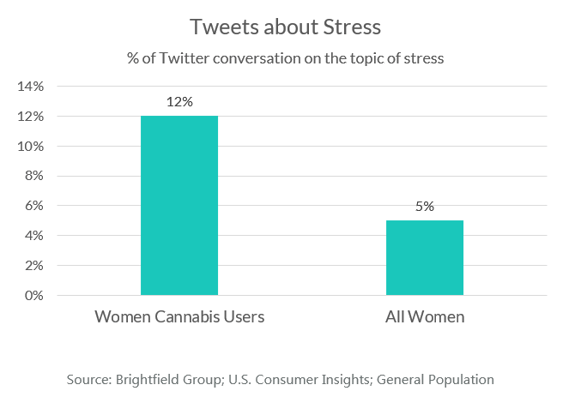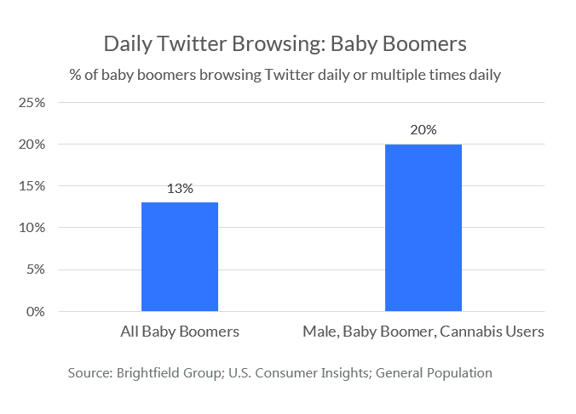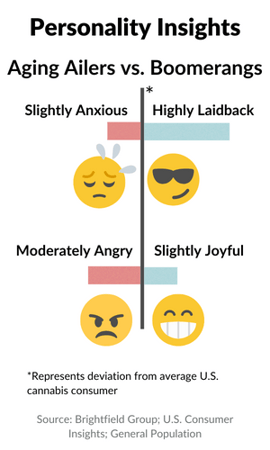The cannabis industry has historically been barred from advertising on social media platforms- until recently. Twitter is the first platform to allow cannabis brands to advertise within its feed as of March 2023. While Twitter is only a tiny slice of the social media available in 2023, it still represents an opportunity to reach new audiences.
The ability to reach a consumer with the right message at the right time is vital to the efficacy of an advertising campaign. While programmatic advertising allows brands to reach hyper-targeted audiences, consumer data provides insight into who that audience is. Cannabis market research allows brands to optimize their target audiences based on real data, not stereotypes or hunches.
Brightfield Group’s consumer insights platforms use survey data and social listening, giving us a more detailed look at how people exist online. Using some of this data, let’s explore how cannabis brands can start to market to cannabis consumers on Twitter.
- Stay Compliant to Reach this Engaged Audience
This new opportunity has its challenges. Twitter has to approve licensed cannabis brands by state, and they must follow guidelines that restrict advertising products and depicting product use. Among other rules, cannabis brands must carefully target consumers in geographical regions where they are legally allowed to sell products. For cannabis brands, staying compliant on Twitter will be vital.
Brands able to get creative and operate within the rules will tap into a cannabis-friendly space where users share daily cannabis content. Twitter has historically been lax about cannabis content, allowing users to post their bong rips and chat back and forth about the price of weed. Accordingly, we see Twitter users are more likely to be cannabis consumers than the average American, according to Brightfield’s consumer insight of the general population.

- Deeply Understand Your Target
If a brand’s knowledge of its target customer stops at demographics and product usage, it will never be able to deliver a pointed message that moves them closer to purchasing. Additional pieces of consumers’ lives are needed to craft ads that reach the right person, catch their eye, and stick in their minds.
In a previous blog post, we explored the persona of “Wake & Bakes,” or consumers who enjoy cannabis daily, including in the morning. This group is also likely to be a parent in their 30s, which may not be what comes to mind when thinking of a daily morning cannabis user. Ads targeted at parents that display an awareness of this daily routine will be much more memorable than broad campaigns attempting to connect to heavy users.
How do brands get deep insights into their target customer? Consumer insights, of course. Successfully marketing in the cannabis industry takes knowing the latest consumer cannabis trends. Brightfield Group’s consumer insights platforms are the most robust and detailed in the industry, capturing a complete picture of modern cannabis users. Our platforms are used to create insight-driven marketing that turns cannabis consumer heads and converts potential shoppers into loyal fans.
- Know Where Their Eyes Are
With attention spans stretched thin, advertising needs to be as creative and entertaining as the content enjoyed in between. Therefore, brands need to understand the full scope of the content their target customers enjoy. Brightfield Group's social media consumer insights allow us to see what influencers, brands, and media sources specific types of consumers are following.
Cannabis-consuming women, for example, are more likely than other Twitter users to follow the influencers, Franchesca Ramsay and Iman. Luxury brands like Louis Vuitton and Versace are also more popular among this group than others on Twitter. Data like this can be used to target specific followings or as creative inspiration for campaigns.
1. Targeting specific followings - When creating ads on Twitter, marketers can use the "Follower Look-alike" feature to reach people with similar interests to an account’s followers. Knowing the influencers a target audience already follows allows advertisers to make data-driven targeting decisions that add to the success of programmatic advertising.

2. Creative inspiration - Knowing the content your customers love allows a brand to craft similar content. If a marketer knows their customers enjoy Versace and similar brands, they can work luxury-inspired imagery into a campaign. Brightfield's social listening data allows marketers to draw inspiration from hundreds of media sources, influencers, and brands in which a target audience is more likely to be interested.
Brightfield's social listening data reveals what topics consumers of specific products talk about most. For women cannabis users, we see them talking about stress significantly more than all women Twitter users. With an understanding of the media they’re viewing and the topics they talk about, marketers can refine how they fit into these conversations.

- Know How They Talk Online
All types of consumers use Twitter, and programmatic advertising lets brands reach them online. But just because a brand can put a message in front of them doesn’t mean it will resonate.
Cannabis brands advertising on Twitter can reach a variety of audiences. For example, baby boomer men who use cannabis are more likely to be on Twitter than the average baby boomer.

But cannabis consumers are not a uniform group. Brightfield Group’s cannabis consumer insights use years of consumer panel data to craft consumer groups, or personas, to help identify types of users. We can explore two groups of cannabis-consuming baby boomers – the boomerangs and the aging ailers.
Cannabis Persona Definitions:
Boomerangs: baby boomers who have returned to using cannabis (i.e., used in youth, stopped, and returned in older age).
Aging ailers: baby boomers or older that report using cannabis for aging ailments or pain.
 Every day, millions of Americans voice their thoughts and opinions online. Brightfield Group’s consumer insights integrated with social listening allow us to see the patterns in these conversations to reveal the psychology and perceptions behind the posts. Is an aging ailer more angry or joyful? Are boomerangs depressed or happy? Which is more fickle or loyal? Let’s use social listening consumer insights panel data to find out.
Every day, millions of Americans voice their thoughts and opinions online. Brightfield Group’s consumer insights integrated with social listening allow us to see the patterns in these conversations to reveal the psychology and perceptions behind the posts. Is an aging ailer more angry or joyful? Are boomerangs depressed or happy? Which is more fickle or loyal? Let’s use social listening consumer insights panel data to find out.
The aging ailer’s language points to an angrier personality. He is slightly anxious rather than laidback. On the other hand, there’s the boomerang – he has a more joyful personality and is very likely to be laidback rather than anxious. Both groups of baby boomer men are more introverted while viewing the world more through thinking than feeling.
Knowing their personalities, a brand can craft distinct advertising copy and use programmatic targeting to reach each unique audience. A playful, fun advertisement appealing to the boomerang’s favorite topics to chat about online will seamlessly integrate into his feed. However, the same messaging could feel out of place among a more aggressive timeline of angry Tweets an aging ailer may scroll through.
Advertising cannabis on Twitter represents a new opportunity for cannabis brands to reach target customers. But tapping into “what’s happening” on Twitter takes the right insights. Brightfield Group’s consumer cannabis data integrated with social media gives brands the advantage of cutting through the noise with insight-backed advertising that works.
Published: 4/24/2023



